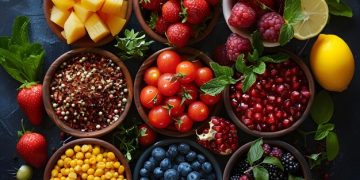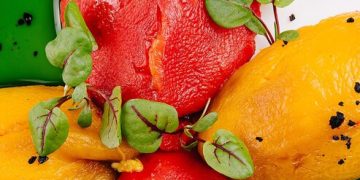Boost Your Immunity This Winter: 5 Superfoods for Health
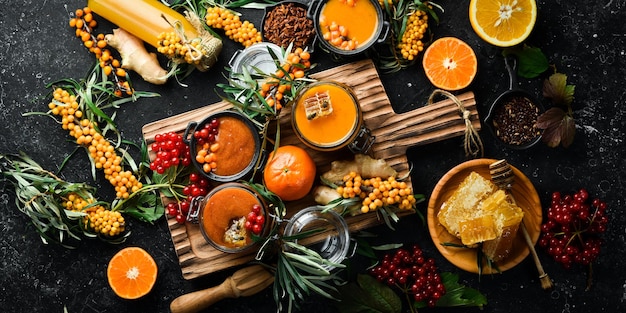
Boosting your immunity this winter requires a strategic intake of specific nutrient-dense superfoods, crucial for strengthening your body’s natural defenses against seasonal illnesses and maintaining overall wellness during colder months.
As winter approaches, many of us turn our attention to staying healthy and warding off seasonal ailments. The quest to Boost Your Immunity This Winter: 5 Superfoods You Need Now isn’t just about avoiding colds; it’s about fortifying your body’s natural defenses to thrive through colder months. This article delves into how targeted nutrition can be your best ally, exploring five powerful superfoods that promise to keep your immune system robust and ready.
Understanding Winter Immunity Challenges
Winter brings with it a unique set of challenges for our immune systems. Shorter days mean less sunlight exposure, impacting our vitamin D levels, which are crucial for immune function. Additionally, cold temperatures can lead to changes in our respiratory tracts, making them more susceptible to viral infections. Understanding these challenges is the first step toward building a resilient defense.
Our bodies are constantly fighting off pathogens, and during winter, this battle intensifies. The common cold and flu are rampant, often leading to widespread absenteeism and discomfort. A well-functioning immune system is paramount, not just for preventing illness but also for a quicker recovery when infections do occur. It’s a complex network of cells, tissues, and organs working in harmony, and its efficiency is heavily influenced by our diet and lifestyle.
The Role of Nutrition in Immune Defense
Proper nutrition is the cornerstone of a strong immune response. Micro and macronutrients play distinct roles, from acting as antioxidants that protect cells from damage to directly supporting the production of immune cells. A nutrient-deficient diet can weaken your body’s ability to defend itself, making you more vulnerable to infections. Conversely, a diet rich in specific vitamins, minerals, and phytonutrients can significantly enhance your immune system’s capabilities.
- Vitamin C: A powerful antioxidant that supports various cellular functions of both the innate and adaptive immune system.
- Vitamin D: Modulates immune responses and has anti-inflammatory properties.
- Zinc: Essential for immune cell development and function, helping to ward off infections.
- Probiotics: Support gut health, which is intricately linked to overall immune function.
Beyond these, various other compounds found in whole foods contribute synergistically to immune health. This holistic approach to nutrition ensures that your body receives all the necessary components to maintain peak immune performance, even amidst harsh winter conditions. It’s about providing the right fuel for your internal defense mechanisms.
Maintaining a balanced diet throughout the year is important, but becoming particularly vigilant during winter can make a significant difference. Focusing on nutrient-dense foods not only strengthens your immunity but also contributes to overall well-being, energy levels, and mood, helping you navigate the colder months with vitality.
A robust immune system doesn’t just happen; it’s cultivated through consistent, mindful choices. Preparing your body for winter means understanding its needs and responding with thoughtful dietary and lifestyle modifications. This proactive approach minimizes the chances of falling ill and maximizes your enjoyment of the season.
Superfood 1: Citrus Fruits – Vitamin C Powerhouses
When we talk about immune-boosting foods, citrus fruits like oranges, grapefruits, lemons, and limes are often the first to come to mind, and for good reason. These vibrant fruits are veritable powerhouses of vitamin C, an essential nutrient renowned for its critical role in supporting a healthy immune system. During winter, when fresh produce can sometimes be scarcer, citrus fruits offer a readily available and delicious way to load up on vital nutrients.
Vitamin C is far more than just a remedy for the common cold; its functions within the immune system are diverse and profound. It acts as a potent antioxidant, protecting immune cells from oxidative damage caused by free radicals generated during normal metabolic processes and immune responses. This protection is vital for maintaining the integrity and function of immune cells. Beyond its antioxidant properties, vitamin C also plays a direct role in boosting the production and function of various white blood cells, such as phagocytes and lymphocytes, which are the immune system’s frontline defenders. It aids in their ability to engulf and destroy invading pathogens and produce antibodies.
Beyond Vitamin C: Other Benefits
While vitamin C is the star, citrus fruits offer a suite of other health benefits that contribute to overall well-being and indirectly support immunity. They contain various phytonutrients like flavonoids and limonoids, which have their own antioxidant and anti-inflammatory properties. These compounds work synergistically with vitamin C to enhance the body’s protective mechanisms.
- Hydration: High water content helps maintain hydration, crucial for overall bodily functions, including nutrient transport and waste elimination.
- Fiber: Provides dietary fiber, which supports gut health. A healthy gut microbiome is increasingly recognized as a key player in immune regulation.
- Potassium: Contributes to maintaining healthy blood pressure and fluid balance.
Incorporating citrus fruits into your daily diet is remarkably easy and versatile. Start your day with a glass of freshly squeezed orange juice, add lemon slices to your water, or enjoy a grapefruit as a refreshing snack. Their bright, tangy flavors can also elevate a variety of dishes, from salads to marinades, making healthy eating both pleasurable and beneficial during the colder months.
Embracing citrus fruits as a staple in your winter diet is a simple yet effective strategy to arm your body with the nutrients it needs to fend off infections. Their immune-boosting capabilities, coupled with their refreshing taste and versatility, make them an indispensable superfood for anyone looking to maintain optimal health through winter. Don’t underestimate the power of these common fruits in bolstering your immune defenses.
Superfood 2: Leafy Greens – Nutrient Density for Defense
Leafy greens, such as spinach, kale, collard greens, and Swiss chard, are often hailed as nutritional powerhouses, and their role in boosting winter immunity cannot be overstated. These vibrant vegetables are packed with an impressive array of vitamins, minerals, and antioxidants, making them essential allies in strengthening your body’s natural defenses. Their nutrient density means you get a lot of bang for your buck in terms of health benefits per serving.
Unlike other food groups, leafy greens offer a broad spectrum of nutrients vital for immune function. They are excellent sources of vitamin A (in the form of beta-carotene), vitamin C, vitamin K, folate, and a plethora of minerals like iron and calcium. Each of these components contributes to the complex orchestration of the immune system, from supporting the integrity of mucous membranes—our first line of defense—to enhancing the production and activity of various immune cells. For example, vitamin A is crucial for maintaining healthy skin and mucous membranes, which act as barriers against pathogens, while folate is essential for cell division and the production of new immune cells.
Key Nutrients and Their Impact
The synergy of nutrients found in leafy greens makes them particularly effective. Beyond the well-known vitamins, they contain unique phytonutrients that offer anti-inflammatory and antioxidant benefits, further supporting immune health. These compounds help to reduce chronic inflammation, which can otherwise suppress immune function, making the body more vulnerable to illness.
- Vitamin A (Beta-carotene): Supports vision, growth, and immune function, especially maintaining healthy mucous membranes.
- Vitamin C: Acts as an antioxidant and boosts white blood cell production.
- Vitamin K: Important for blood clotting and bone health, and emerging research suggests a role in immune modulation.
- Folate: Crucial for DNA synthesis and repair, and for the healthy development of immune cells.
- Antioxidants: Help neutralize free radicals, reducing oxidative stress on immune cells.
Incorporating leafy greens into your winter diet is surprisingly easy. They can be added to almost any meal. Blend a handful of spinach into your morning smoothie for a nutrient boost, sauté kale with garlic as a side dish, or use collard greens as wraps for a light, healthy meal. Their versatility makes it simple to increase your intake of these vital nutrients regularly.
Making leafy greens a consistent part of your diet is a powerful step towards building robust winter immunity. Their rich nutrient profile directly supports various immune functions, while their antioxidant and anti-inflammatory properties create an optimal internal environment for your body to defend itself against winter pathogens. Don’t overlook these humble yet mighty vegetables in your immune-boosting strategy.
Superfood 3: Garlic and Ginger – Culinary Immune Boosters
Garlic and ginger are more than just common kitchen staples; they are time-honored superfoods revered for their potent medicinal properties, especially when it comes to supporting the immune system. For centuries, these two ingredients have been central to traditional medicine practices around the globe, and modern science is increasingly confirming their health benefits. Incorporating them generously into your diet during winter is a smart move for bolstering your defenses.
Garlic’s immune-boosting power primarily comes from sulfur-containing compounds like allicin, which is released when garlic is crushed or chopped. Allicin has well-documented antibacterial, antiviral, and antifungal properties, making it a formidable weapon against various pathogens. Regular consumption of garlic has been linked to a reduced frequency of colds and flu, as well as a decrease in the severity of symptoms. It also appears to stimulate various types of immune cells, enhancing their ability to fight off infections.
Ginger’s Warming and Healing Properties
Ginger, on the other hand, is rich in gingerol, a bioactive compound responsible for much of its medicinal qualities, including its pungent flavor. Gingerol is a powerful anti-inflammatory and antioxidant, which helps to reduce inflammation throughout the body—a factor that can suppress immune function if chronic. Ginger is also well-known for its ability to soothe sore throats, alleviate nausea, and reduce congestion, common symptoms during winter illnesses. Its warming effect is an added bonus during colder months.
- Garlic: Contains allicin, which offers antibacterial, antiviral, and antifungal effects, directly combating pathogens.
- Ginger: Rich in gingerol, providing anti-inflammatory benefits and helping to alleviate cold and flu symptoms.
- Antioxidant Power: Both superfoods contain compounds that neutralize damaging free radicals, protecting immune cells.
- Circulation Boost: Can improve circulation, potentially helping immune cells travel more efficiently.
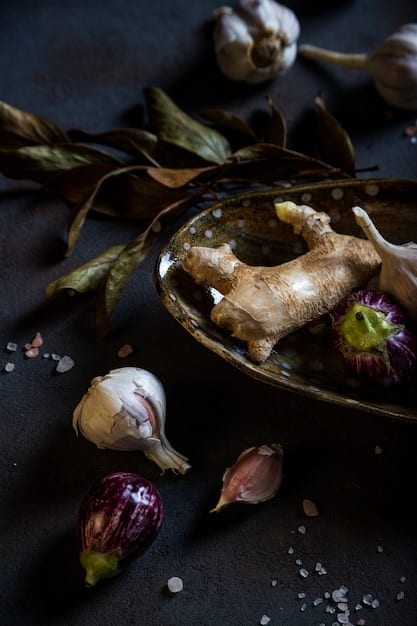
Integrating garlic and ginger into your daily meals is easy and adds incredible flavor. Use fresh garlic in stir-fries, sauces, and soups. Add grated ginger to teas, smoothies, or vegetable dishes. A simple ginger-lemon tea can be a comforting and immune-supportive drink on a cold winter evening. Their potent properties work best when consumed raw or lightly cooked, as excessive heat can degrade some of their beneficial compounds.
Embracing garlic and ginger as essential components of your winter diet is a flavorful way to fortify your immune system. Their natural antimicrobial and anti-inflammatory effects provide substantial support, helping your body to resist infections and recover more quickly. These culinary superstars prove that sometimes the most powerful medicine can be found right in your kitchen.
Superfood 4: Berries – Antioxidant Richness for Resilience
Berries—strawberries, blueberries, raspberries, and cranberries—are far more than just delicious treats; they are tiny powerhouses of nutrition, particularly rich in antioxidants, making them crucial for bolstering your immune system during winter. Their vibrant colors are a testament to the high concentration of beneficial plant compounds they contain, which play a significant role in protecting your cells and supporting overall health.
The true strength of berries lies in their exceptional antioxidant content. They are loaded with anthocyanins, ellagic acid, and resveratrol, among other phytonutrients, which are potent free-radical scavengers. Free radicals can cause oxidative stress in the body, leading to cellular damage and potentially weakening immune responses. By neutralizing these harmful molecules, antioxidants help to maintain the integrity and function of immune cells, allowing them to perform their protective duties more effectively. This protective action is particularly valuable during winter when the body may be under increased stress from environmental factors and circulating pathogens.
Diverse Benefits for Immunity and Beyond
Beyond their antioxidant prowess, berries also supply a good amount of vitamin C and dietary fiber, further contributing to their immune-boosting profile. Vitamin C, as discussed, is a cornerstone of immune health, while fiber supports a healthy gut microbiome, which is intricately linked to systemic immunity. A balanced gut flora can produce beneficial compounds that influence immune cell development and function, making gut health a critical component of winter wellness.
- Anthocyanins: Provide rich color and strong antioxidant properties, reducing oxidative stress.
- Ellagic Acid: Another powerful antioxidant, found abundantly in raspberries and strawberries.
- Vitamin C: Supports various immune cell functions and acts as an antioxidant.
- Dietary Fiber: Promotes a healthy gut microbiome, which is crucial for immune regulation.
Berries are incredibly versatile and easy to incorporate into your diet. Enjoy them fresh as a snack, add them to your morning oatmeal or yogurt, blend them into smoothies, or even use them in baked goods or desserts. Frozen berries retain most of their nutritional value and are an excellent option for year-round availability, ensuring you can still harness their immune-boosting benefits even when fresh berries are out of season.
Making berries a regular part of your winter diet is a delicious and effective strategy for enhanced immunity. Their rich antioxidant profile provides essential cellular protection, while their vitamin C and fiber content further support a robust immune system. These small but mighty fruits are truly a gift from nature, offering a sweet way to safeguard your health through the colder months.
Superfood 5: Yogurt and Fermented Foods – Gut Health Connection
The crucial link between gut health and a robust immune system has gained significant scientific attention, making yogurt and other fermented foods indispensable superfoods, especially during winter. A healthy gut microbiome – the community of microorganisms residing in our intestines – is a cornerstone of strong immunity. Fermented foods are rich in beneficial bacteria, known as probiotics, which play a pivotal role in maintaining this delicate balance.
The gut is often referred to as the “second brain” and, remarkably, houses a significant portion of our immune system. The beneficial bacteria found in fermented foods like yogurt, kefir, sauerkraut, kimchi, and kombucha help to strengthen the gut barrier, preventing harmful substances from entering the bloodstream. They also modulate immune responses, helping to educate immune cells and ensuring they react appropriately to pathogens without overreacting to harmless substances. A balanced gut flora can directly influence the production of various immune cells and antibodies, thereby enhancing the body’s overall ability to fight off infections, which is critical during the winter season.
Diverse Probiotics and Their Actions
Different fermented foods offer a variety of probiotic strains, each with unique benefits. This diversity is important for a comprehensive approach to gut health and immunity. Beyond probiotics, many fermented foods are also more digestible due to the fermentation process, making their nutrients more bioavailable to the body.
- Yogurt: Contains live cultures like Lactobacillus and Bifidobacterium, supporting digestive health and immune function.
- Kefir: A fermented milk drink with a wider range of beneficial bacteria and yeasts than yogurt.
- Sauerkraut & Kimchi: Fermented cabbage dishes that are rich in probiotics and vitamins K and C.
- Kombucha: A fermented tea that offers probiotics and antioxidants.
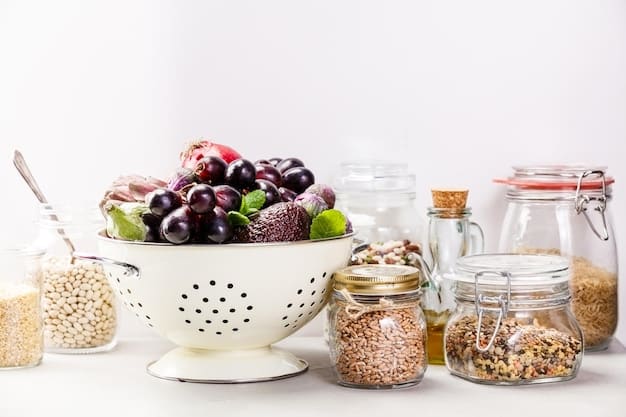
To maximize the immune-boosting effects, opt for plain, unsweetened varieties of yogurt and other fermented foods to avoid added sugars, which can counteract some of the benefits. Incorporating these foods into your daily diet is simple: enjoy yogurt with fruit and nuts for breakfast, add sauerkraut to sandwiches, or sip on kefir or kombucha throughout the day. Consistency is key to fostering a thriving gut microbiome.
Embracing yogurt and other fermented foods is a powerful strategy for building robust winter immunity by nurturing your gut health. Their rich probiotic content strengthens your body’s internal defenses, contributing to a more resilient immune system capable of warding off seasonal illnesses. Make these gut-friendly superfoods a cornerstone of your winter wellness plan.
| Key Superfood | Immunity Benefit |
|---|---|
| 🍊 Citrus Fruits | Rich in Vitamin C, boosts white blood cell production and acts as an antioxidant. |
| 🥬 Leafy Greens | Packed with Vitamins A, C, K, and antioxidants for cellular protection and immune support. |
| 🧄 Garlic & Ginger | Possess antiviral, antibacterial, and anti-inflammatory properties to combat infections. |
| 🍓 Berries | High in antioxidants (anthocyanins) protecting immune cells and reducing oxidative stress. |
| 🥛 Fermented Foods | Introduce beneficial probiotics for a healthy gut microbiome, vital for immune regulation. |
Frequently Asked Questions About Winter Immunity
Winter presents unique challenges to our immune systems, including reduced sunlight exposure affecting vitamin D levels, and increased prevalence of respiratory viruses like cold and flu. A strong immune system is crucial to effectively fight off these common seasonal infections and maintain overall health during colder months.
While diet plays a significant role in strengthening your immune system and reducing susceptibility to illness, it’s part of a broader wellness strategy. A balanced diet, rich in superfoods, combined with adequate sleep, regular exercise, stress management, and good hygiene practices, provides the most comprehensive protection.
Integrating superfoods can be simple. Add citrus to water or salads, blend leafy greens into smoothies, use garlic and ginger in almost any savory dish, snack on berries, and include yogurt or kefir in breakfast or snacks. Consistency is key to reaping their maximum benefits throughout the winter season.
Supplements can provide certain nutrients, but whole foods offer a complex matrix of vitamins, minerals, fiber, and phytonutrients that work synergistically and are often more effectively absorbed. While supplements can bridge gaps, they should not replace a diverse diet rich in whole foods like the superfoods mentioned for optimal immune support.
The gut microbiome profoundly influences immune function. Beneficial gut bacteria (probiotics) enhance the gut barrier, prevent pathogen colonization, and regulate immune cell activity. During winter, a healthy gut helps maintain a strong immune response, making fermented foods like yogurt vital for supporting this internal defense system.
Conclusion
As we navigate the colder, darker days of winter, the emphasis on strengthening our immune systems becomes paramount. By proactively incorporating these five remarkable superfoods—citrus fruits, leafy greens, garlic, ginger, berries, and a variety of fermented foods—into our daily diets, we provide our bodies with an arsenal of essential nutrients, antioxidants, and beneficial probiotics. These dietary choices don’t just ward off the common cold; they actively nourish and fortify the complex networks of our immune system, fostering a resilient defense against a myriad of seasonal challenges. Such an intentional, nutrient-rich approach ensures that our bodies are not just surviving winter but thriving through it, empowered by the very best nature has to offer for profound health and vitality.
